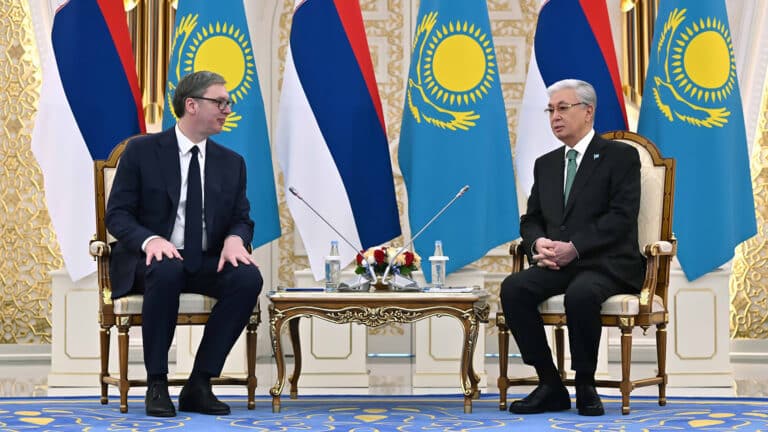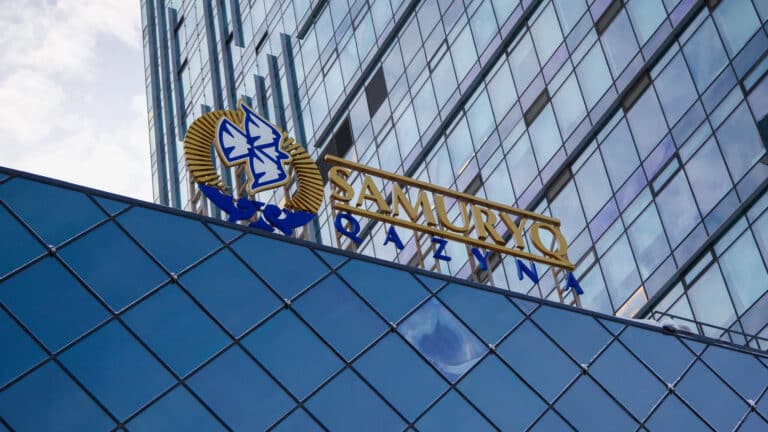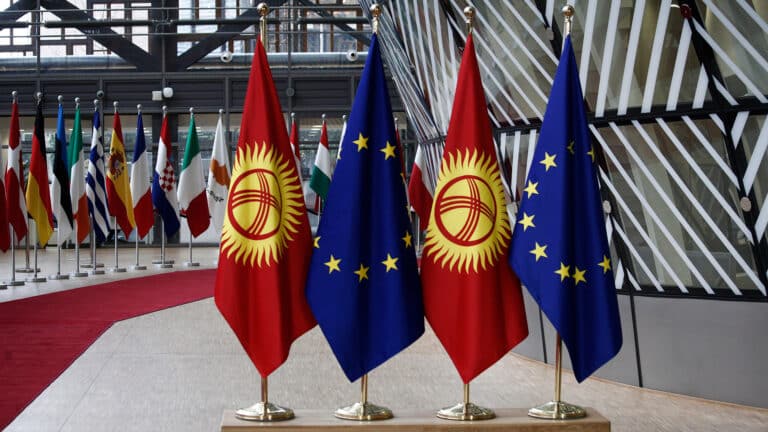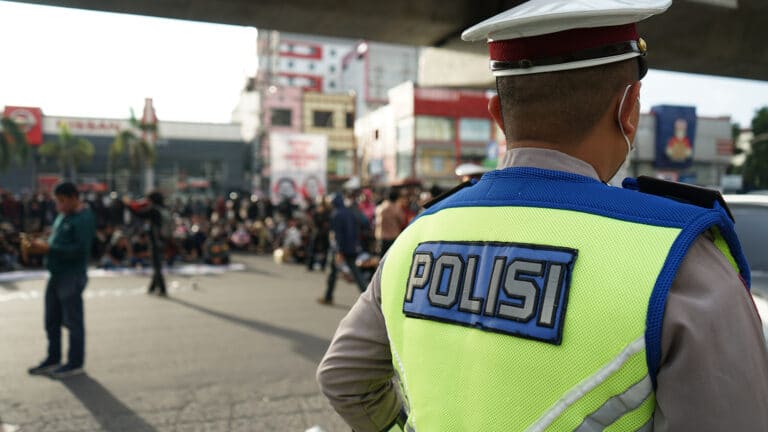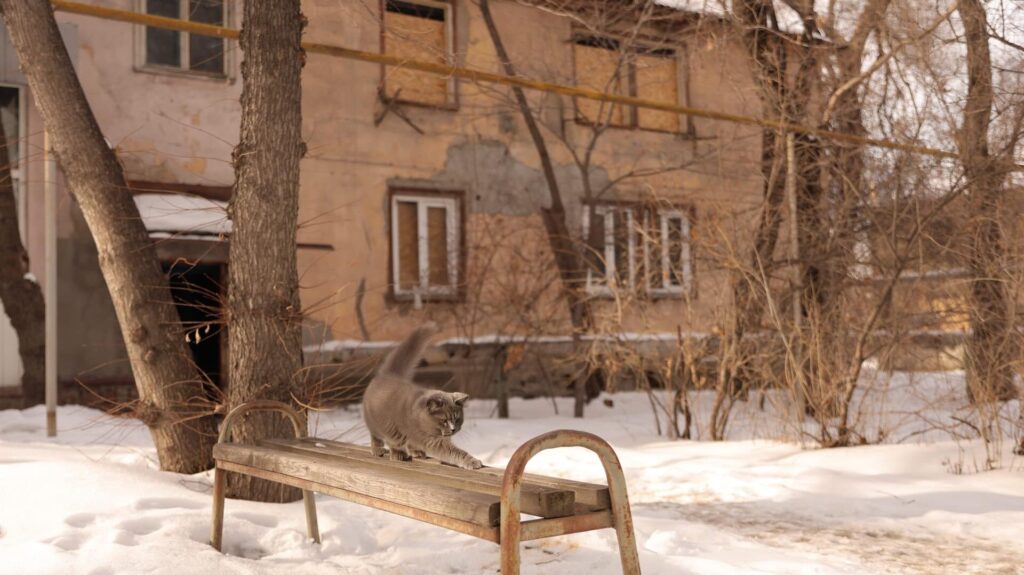
Almaty has adopted a new housing renovation program, marking the city’s third attempt in 13 years to curb the expansion of its dilapidated housing stock. The program, set to run until 2030, is expected to prioritize the interests of the city over those of developers.
This third improvement plan, adopted in late 2024, aims to sweep dilapidated and non-seismic one- and two-story residential blocks built over the period from the 1930s to the 1970s. Between 2012 and 2015, city authorities implemented a pilot house improvement project and, in 2021, launched a full-fledged renovation program. Even though the program was supposed to last through 2025, authorities scrapped it a couple of years ago.
Between promises and performance
Within the pilot stage of the renovation, which took place from 2012 to 2015, 56 dilapidated residential buildings for 579 apartments were demolished, and 63 new blocks with 2,400 apartments were built instead. Capital Construction Company (CCC) was in charge of this stage of the renovation.
The second renovation program was launched six years later, in 2021. It involved demolishing 708 dilapidated blocks (with 6,600 apartments) suffering from a wear-and-tear rate exceeding 61% across all of Almaty’s districts and was anticipated to be completed by 2025. The majority of high-rise blocks (515 towers instead of 458 dilapidated blocks) were expected to be constructed by private investors at their own expense. To do so, developers were required to obtain consent from all the residents of their apartments to be bought out and receive approval for the proposed project at public hearings. This meant that even if one owner refused to accept the conditions proposed, the building could not be demolished. If citizens weren’t satisfied with the project, the developer had to revise it, aligning it with the people’s preferences. On top of that, developers were supposed to pay for shelter for those who agreed to move, demolition works, enhancing district green spaces and building new schools, kindergartens and other vital infrastructure.
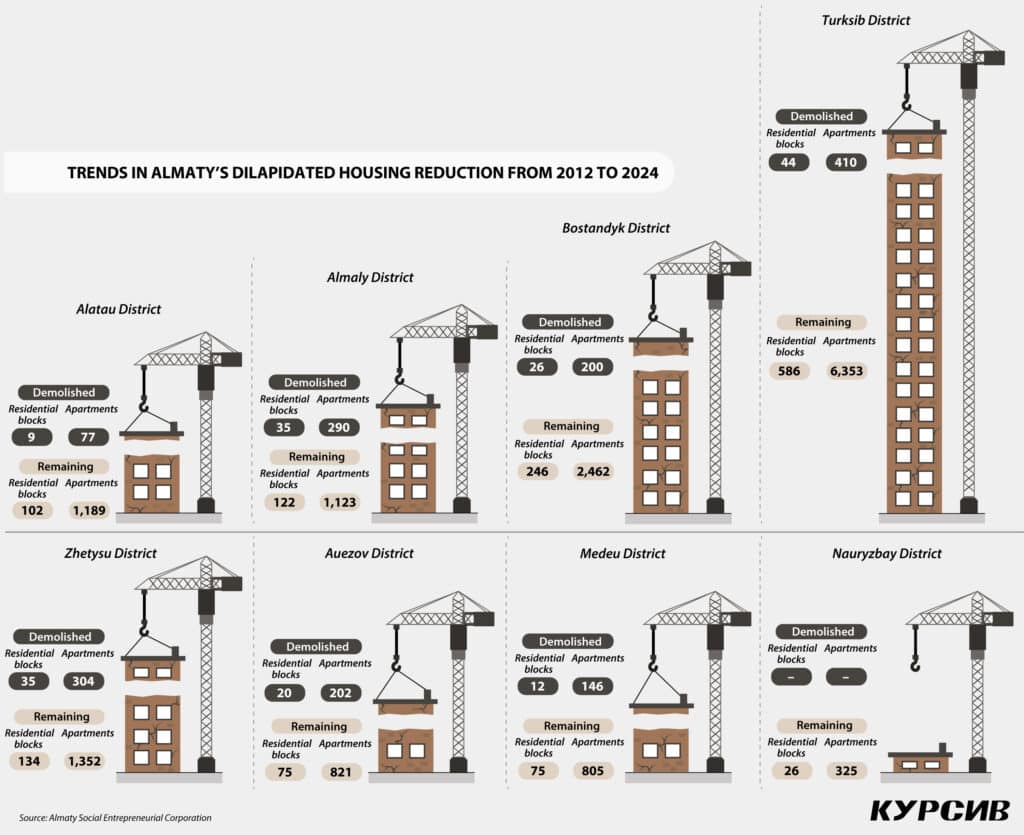
Demolition of 250 dilapidated blocks violating building setback rules and those located within water protection areas was to be funded by the government. Parks, public spaces, kindergartens and 163 residential blocks were intended to appear instead.
The entity responsible for the project also changed: Almaty Social Entrepreneurial Company (SEC Almaty), a government institution established in 2010 and aimed at maintaining the city’s social development, was appointed. The plan was to allocate approximately $98.2 million from the budget, roughly $19.64 million annually over five years, to the project.
Yet, this program failed to take off.
Renovation of discord
In fact, nobody endorsed the 2021 renovation program, beginning with area residents and developers, and ending with urban planners.
The project, proposed by the K7 Group developer and aligned with a work specification by SEC Almaty, aimed to transform a low-rise residential quarter near Almaty Main Botanic Garden and the Atakent business cooperation center (bounded by Auezov, Bukhar Zhyrau, Manas and Gabdullin Streets) into a commuter town dominated by high-rise towers. This transformation was opposed by both locals and urban planners. According to specialists at Urban Forum, the area had the potential to become «an interesting and unique alternative to the ‘Golden Quarter.’» However, reducing the number of stories would have been unprofitable for the developer. As a result, the project was canceled.
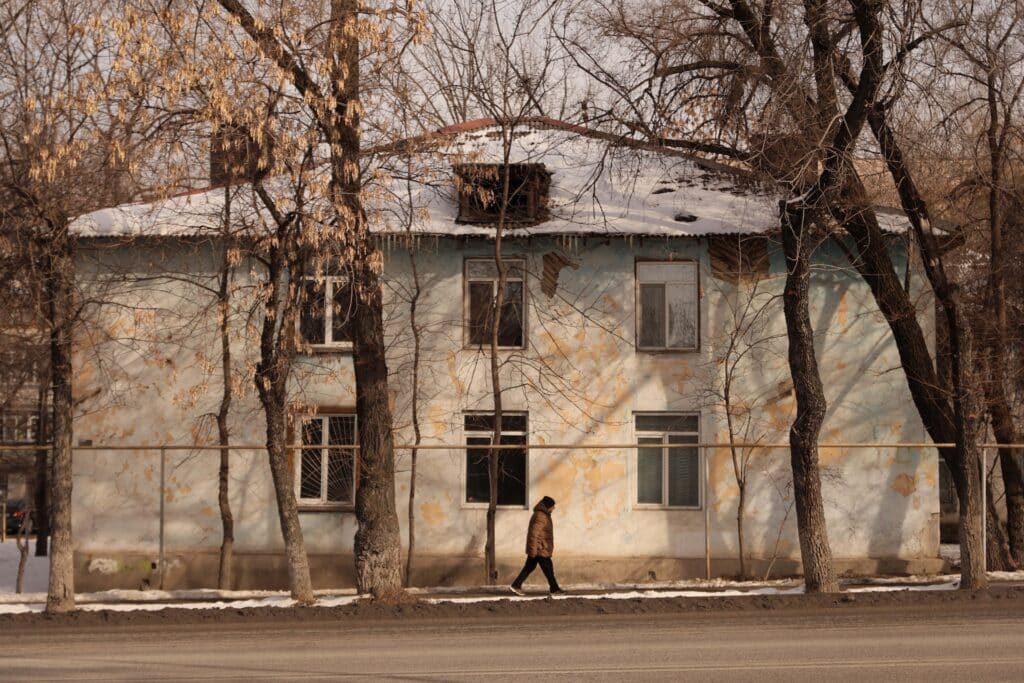
«Without unanimous consent, the project was canceled, and contractual arrangements with the investor were terminated in 2022. According to Almaty’s approved detailed plan, buildings taller than three stories can’t be constructed on the site, making the project economically unfeasible,» Altynbek Nuratuly, deputy chairman of the CCC board, told Kursiv.media. He also noted that developers faced another challenge: the inflated expectations of dilapidated apartments’ owners.
According to SEC Almaty, an Almaty resident and his relatives (names not disclosed) owned four apartments in dilapidated buildings in the Almagul micro-district, half of which were purchased between 2021 and 2024. They wanted to sell two one-bedroom apartments at a rate of around $2,500 per square meter and, in exchange for a two-bedroom apartment of 45 square meters, receive a new unit of at least 130 square meters. Alternatively, they were willing to sell all four apartments, totaling 141.3 square meters, for approximately $393,000 ($2,750 per square meter) — nearly three times the average price for secondary housing (around $1,000 per square meter as of December 2024, according to Kazakhstan’s Bureau of National Statistics).
Anticipating public backlash against replacing low-rise housing stock with towers, along with the challenges of rehousing residents, investors were reluctant to commit to renovation programs. «There aren’t that many developers willing to implement these projects, especially in the Turksib district. Everyone is, of course, interested in building towers downtown,» said Askar Bilisbekov, chairman of the SEC Almaty board, in 2021.
Following stricter urban planning regulations in Almaty, including height restrictions and a ban on infill construction, developers ultimately lost interest in housing improvement programs. «Taking into account the city’s development regulations, which emphasize moderate density and walking access to social facilities as outlined in Almaty’s official community plan for 2024, investors’ interest in renovation has declined,» Nuratuly said.
«Renovation work under the 2021-2025 program was underway for two or two and a half years before being paused by Mayor Yerbolat Dossaev (appointed in January 2022), who instructed SEC Almaty to develop a new program,» Adil Nurmakov, co-founder of Urban Forum Kazakhstan, told Kursiv.media.
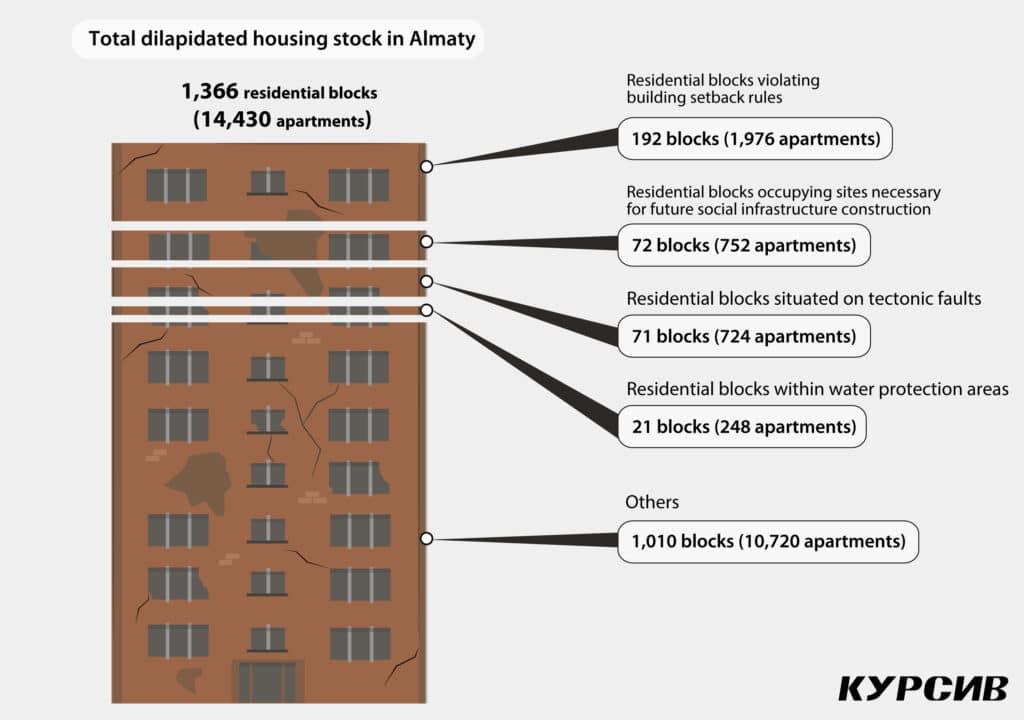
Bad influence
«We did not have our own successful renovation models. Instead, we relied on the flawed post-Soviet approach, whereas globally — in China and Europe, for example — renovation is seen as a tool to drive changes: creating jobs, fostering local communities, preserving history, restoring natural resources and establishing a sustainable environment. New value has not emerged, since new economic activities have not appeared (and capitalization has not increased),» the list of reasons for the previous programs’ failure stated.
The Almaty City Planning and Urbanism Department emphasized a «lack of a systematic approach» and «insufficient funding.» At the same time, Dossaev highlighted that previous legislation did not even define the term «renovation.»
«Work specifications for the renovation were developed without proper analysis. As a result, without comprehensive research and analysis, authorities had to delegate the renovation process to developers, who prioritized profitability over urban priorities,» said Nurlan Buranbayev, head of the Almaty City Planning and Urbanism Department, during an Almaty administration meeting in late 2024.
As a result, instead of nearly 800 dilapidated blocks initially planned, authorities managed to demolish fewer than 200 over 13 years, rehousing only 1,600 tenants, far short of the 7,500 originally anticipated.
Quarter-by-quarter update
The 2024-2030 renovation program aims to update 676 dilapidated buildings (7,500 apartments), including 71 located on tectonic faults, as pledged by Almaty’s administration. The goal for this year is to rehouse 667 residents, with that number expected to double annually.
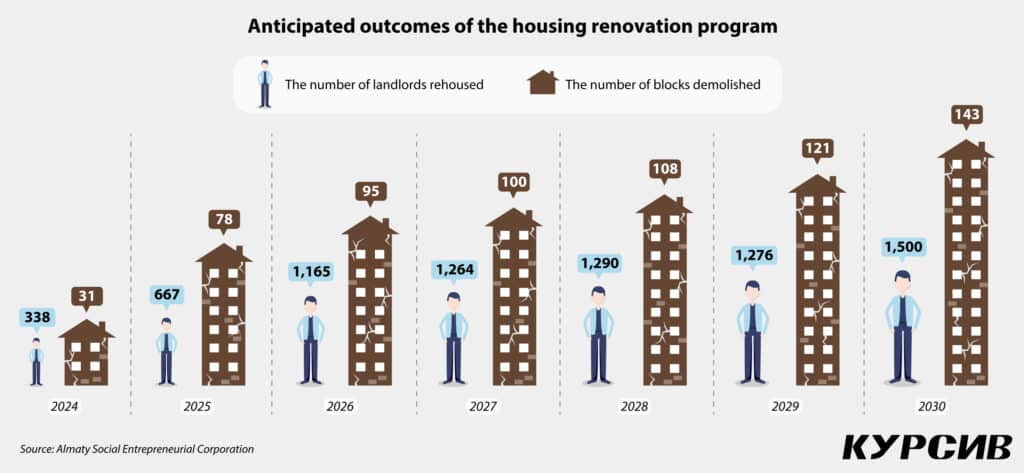
Quarterly development is one of the three pillars of the program, a new approach meant to protect owners’ rights and to improve communication between residents and the public.
This approach ensures compliance with urban planning regulations on infill density, as well as social, utility and transport infrastructure, while also maintaining the city’s architectural aesthetics in line with the official community plan.
Three compensation options are offered to landlords of dilapidated apartments. These include housing exchange based on the room-for-room formula, regardless of the number of occupants; providing an equivalent dwelling after a new block is completed, with temporary accommodation supplied during construction; and purchasing the dilapidated property at market value, as determined by an independent appraisal company. The new program retains the condition of unanimous approval before demolition. However, if residents refuse the proposal by SEC Almaty, they assume all the risks of continuing to live in the dilapidated building.
The renovation process transparency is promised to be ensured through revealing the information with mass media and posting updates on the SEC Almaty website. Additionally, a new body, the Renovation Office, has been established to facilitate cooperation between each project participant.
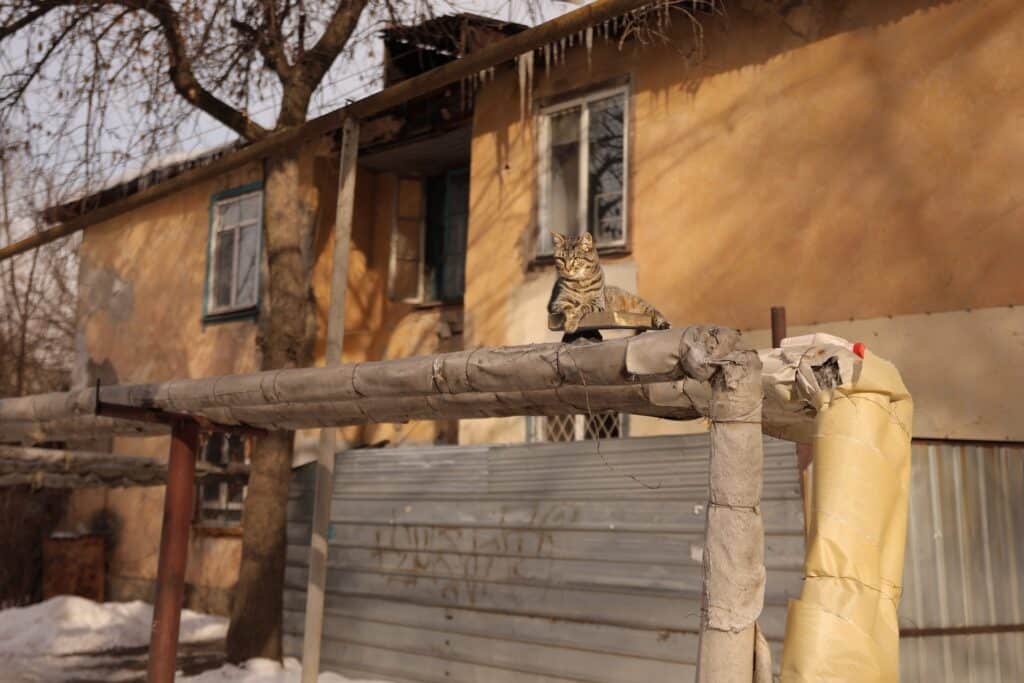
Divided by categories
The main novelty of the renovation program until 2030 is the classification of dilapidated housing into three categories based on its investment attractiveness.
The first category comprises residential blocks that violate setback rules or are located on sites designated for the construction of utility infrastructure and social facilities. The city administration is responsible for acquiring and demolishing these buildings.
The second category applies to blocks situated in the areas designated for the construction of residential, social and commercial buildings that are a priority for the city. Occupant rehousing and building demolition are to be performed by the CCC, while the land plots are expected to be sold to investors at market value. Notably, SEC Almaty doesn’t require every landlord to agree to the conditions within this category to rehouse them.
The CCC believes that the developers express keen interest in the land plots freed from the dilapidated buildings against the backdrop of lack of available space in Almaty, given that the company does not need to carry out occupant rehousing. «As of today, prominent developers are examining opportunities for constructing commercial property and other property types in place of dilapidated buildings after landlord rehousing, despite the prime cost increase of the land plots,» Nuratuly said.
Finally, only the third category is estimated as appealing for investment: residential blocks located within quarters, subcenters and industrial areas that require a comprehensive update. Responsibilities for both rehousing and demolition are to be borne by private investors, performing all the work at their own expense.
To demolish the buildings and rehouse the occupants until 2030, the city administration is set to allocate approximately $235.7 million and raise $1.9 billion from private investors.
«In 2024, $58.9 million was allocated for the state budget to acquire 1,100 apartments to shape a rehousing stock. Starting in 2026, these funds will be redirected to the renovation program, taking into account the contributions made by the CCC to investment attractive sites,» Buranbayev said.


